Photo courtesy of Doja Cat
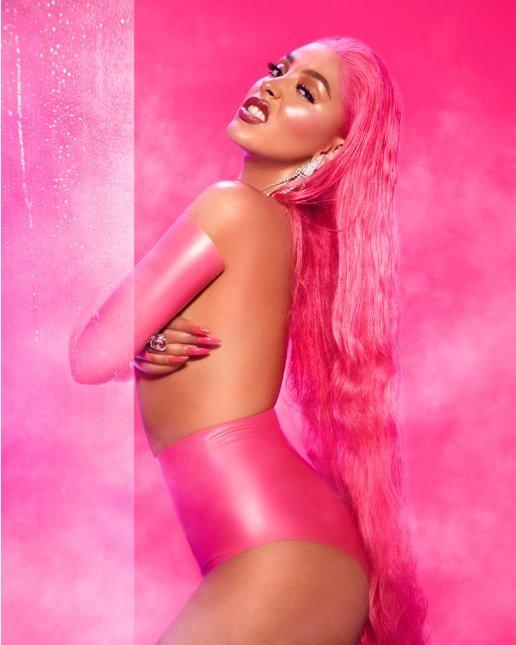
Doja Cat
news
Backstage At The 63rd GRAMMYs: Doja Cat Looks Forward To The 2021 GRAMMY Awards Show, Backward To Her Beginnings
Doja Cat, who is up for Best New Artist, Record Of The Year and Best Pop Solo Performance at the 2021 GRAMMY Awards show, surveys her past trajectory ahead of her performance at the ceremony
When Doja Cat is asked how the phrase "Best New Artist: Doja Cat" sounds in her estimation, memories of her unassuming beginnings as a cow-suited TikTok provocateur briefly flicker across her visage.
"It sounds crazy," finally allows the three-time nominee, who first garnered applause by penning the bovine viral hit "Mooo!" back in 2018. "Also, because I didn't like my name for a long time. I named myself when I was, like, 16." (The artist born Amala Ratna Zandile Diamini takes a simulated drag to illustrate the headspace behind her nom de plume.)
"But now, I feel like it makes sense," Doja Cat continues, constellating her early work with her full-fledged performance on CBS this Sunday. "It's all coming together. It's all full circle, and I'm very happy about that."
Watch Doja Cat's final expressions before her performance at the 2021 GRAMMY Awards show on Sunday, March 14, and be sure to tune in to see if she'll win Record Of The Year, Best Pop Solo Performance (for "Say So") and/or Best New Artist.
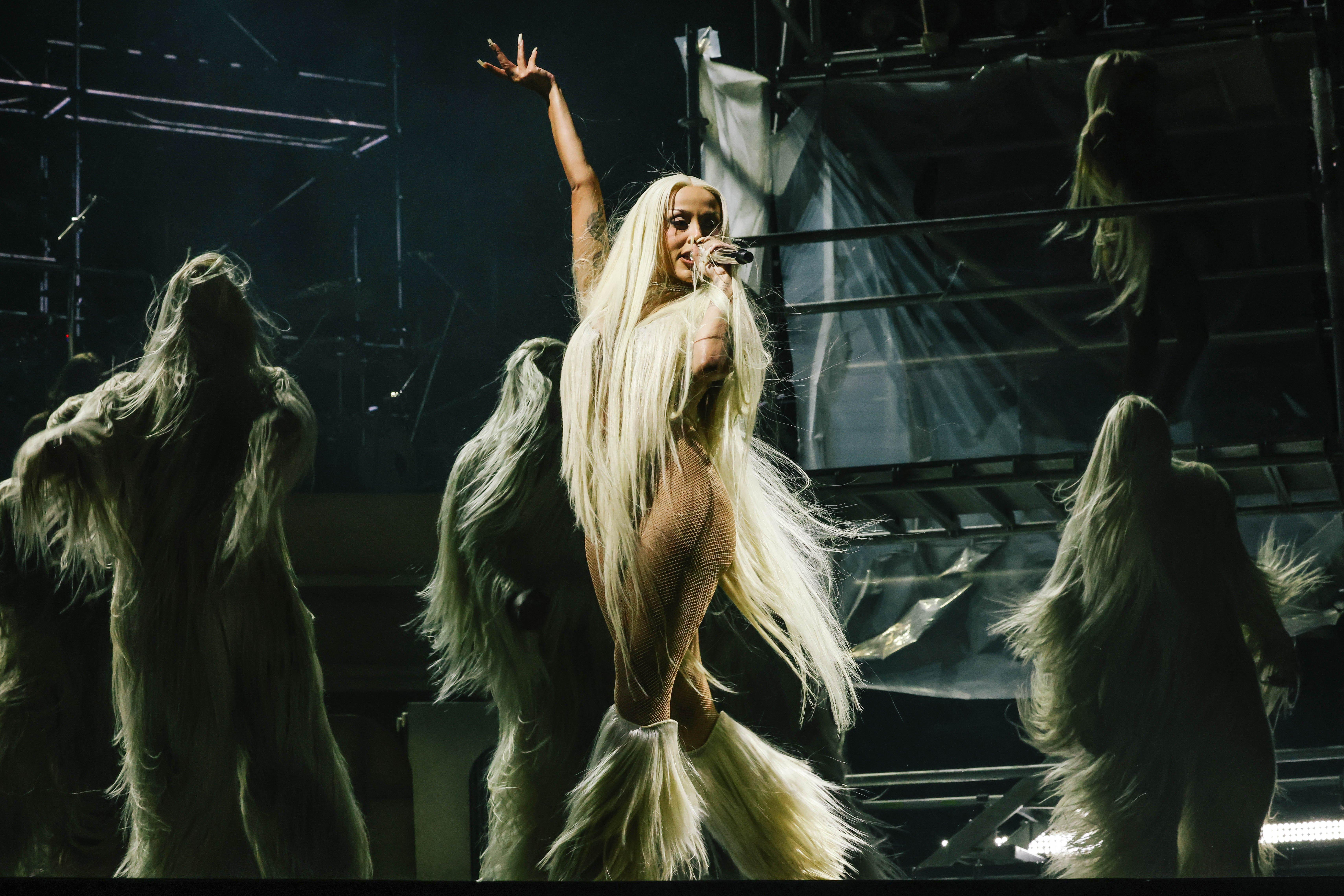
Photo: Dania Maxwell / Los Angeles Times via Getty Images
list
7 Incredible Sets From Coachella 2024 Weekend 1: Doja Cat, No Doubt, Raye & More
With a weekend full of surprise guests, exciting reunions and breakout performances from first-time performers, this weekend in Indio was one for the books. Read on for seven of the top performances at the first weekend of Coachella 2024.
While every headliner at last year’s Coachella held some sort of historical cultural significance, Coachella 2024’s roster instead represented a series of graduations from opening slots and side stages to top-tier main stage titan status.
Friday featured Lana Del Rey, whose sole previous Coachella performance was at the Outdoor Theatre in 2014. Saturday was capped by Tyler, The Creator appearing for the third time in Indio (his last appearance as runner up to Haim and Beyoncé on the main stage in 2018). And on Sunday, Doja Cat occupied the uppermost spot after her penultimate main stage appearance in 2022.
Yet Coachella Weekend 1 this year’s attendees got astronomically more bang for their buck than they counted on, due to a surprise-guest-heavy lineup. The bulk of those special moments came from A-list talent, from Billie Eilish with Lana Del Rey to Olivia Rodrigo with No Doubt, Justin Bieber joining Tems, Kesha with Reneé Rapp, most of the Fugees performing alongside YG Marley, Will Smith performing "Men in Black" with J Balvin … the list goes on.
When all was said and done, the diversity, quality and impact of the weekend’s performances were tremendous. Even without elite bonus appearances, there were plenty of performances — quite a few of them newcomers, recent buzzbands and imminent breakthroughs — that made this year’s Coachella more than worthy of an early accolade for one of the first-rate fests of 2024. Read on for seven of the best sets from Coachella 2024.
Faye Webster Thrills Loyal Fans With Supreme Confidence
Underneath the shaded canopy of the Mojave Tent, Faye Webster held her sprawling audience in the palm of her hand during her Coachella debut on Friday. Deafening cheers rang out at the start of every song, which seemed to infuse the 26-year-old singer/songwriter with a level of energy unparalleled up to this point in her career.
Webster deftly worked her way through 11 tracks, each one received with wild cheers from fans, who sang with such gusto that they often nearly overpowered her own vocals. The crossroads of her confidence and creativity fully manifested during closing tune "Kingston," which saw her pausing to let the audience belt out the remainder of the line, a beckoning gesture that exuded self-assuredness.
Notably, three of six new songs ("Wanna Quit All the Time," "He Loves Me Yeah!" and "Lego Ring") from her recently released fifth album Underdressed at the Symphony were live debuts. The fact that Webster saved them for Coachella showed a clear intention to ensure the set was extra special. Beyond any shadow of doubt, she succeeded.
Lana Del Rey Taps Billie Eilish, Jon Batiste & Others For Standout Friday Set
With her notoriously downtempo demeanor, Lana Del Rey wasn’t the obvious choice for a Friday headlining spot on the main stage, but when all was said and done, her 20-song set delivered plenty to position her as a standout performer.
Dressed in an elegant baby blue gown, her entrance — a slow ride on the back of a motorbike through the lanes of the crowd all the way to the stage — worked wonders to build excitement. And her first three song choices, a shortened version of "Without You" (not performed since 2014) and two more gems from the vault — "West Coast" (debuted 10 years ago to the day at her first Coachella appearance) and her superb cover of Sublime’s "Doin’ Time" — signaled her intention to make this show a truly special occasion (neither of the latter two tunes have appeared on a setlist since 2019).
From there it was a parade of hits culled from her robust catalog, as the GRAMMY-nominated singer waltzed her way across the expanse of a fairytale palace stage production, at several points venturing up flights of stairs to a towering terrace. Four of her 10 albums feature production from Jack Antonoff (who played with Bleachers on Saturday), so it was unsurprising when he took the helm of the white grand piano toward the end for a strikingly serene duet with a hologram Lana on "Hope is a Dangerous Thing for a Woman Like Me to Have — But I Have It."
Jon Batiste (who performed his own set on Saturday) also assisted on piano for an alluring take on "Candy Necklace," but the pinnacle moment arrived during performances of "ocean eyes" and "Video Games" alongside surprise guest Billie Eilish. Sitting side by side atop a balcony, the two harmonized through much of those tracks, and the occasions when Lana sat back to let Billie sing several sections solo were absolutely arresting. The two superstars stared adoringly at each other throughout, clearly just as awe-inspired by the unprecedented collaboration as the audience, which erupted with rapturous applause that rivaled the decibels of the set’s glittering fireworks finale.
Raye Races Toward Superstardom During Emotional Debut
After just one song of Raye’s Saturday afternoon performance, there was no question that her Coachella debut would be remembered as one of the most striking in recent years. The British songwriter and chanteuse, who shattered the record for most wins and nominations in a single year at this year’s BRIT Awards, poured every ounce of her soul into her 45-minute set. The crowd inside the Mojave tent hung on every note and went absolutely berserk all the way from the sultry intro of "The Thrill is Gone" to gloriously anthemic closer "Escapism."
Backed by a powerhouse band of eight backup singers, three string players, four brass aces and the standard guitar, drums and bass, each song was a showstopper. Without question, the most impactful moment came on "Ice Cream Man," which deals with her own experience with sexual assault and rape.
"I want you to know it’s not an easy song to sing," she started. And before she could continue, the audience released a loud roar of support, to the point that the singer shed tears. When she composed herself, she continued, "But it’s important to be loud .. and to be brave. This allows me to be loud about something I’ve been quiet about my entire life. I am very f—ing strong."
That moment — which culminated into a big band-style belter that evoked the power of Amy Winehouse and Billie Holiday — likewise drew tears from many in the audience. Further, it defined Raye as an artist destined for superstardom on the merits of genuine talent, an infinitely infectious spirit, and incomparably hard work ethic. To that end, it should be no surprise she’s the songwriter behind tunes from GRAMMY-winning artists including Beyoncé, no big deal.
Sublime Revives Their Definitive Sound Alongside Jakob Nowell
Though many were referring to Sublime’s Saturday afternoon appearance on the Coachella main stage as a "reunion" in the days leading up to the festival, new frontman Jakob Nowell — son of the band’s deceased original singer Bradley Nowell — made it abundantly clear that wasn’t precisely the case.
"My name is Jakob Nowell and this is Sublime," he said following the conclusion of opening song "April 29, 1992," gesturing toward the beloved Southern California ska-punk band’s surviving members bassist Eric Wilson and drummer Bud Gaugh.
Read more: Sublime's Jakob Nowell On Leading His Father's Legendary Band & What To Expect At Coachella
His resistance to co-opt his dad’s legacy was admirable, which was an issue for some when Rome Ramirez joined Wilson and Gaugh in 2009 to form Sublime with Rome, a chapter that ended for those original members when Gaugh left the band in 2011 and Wilson subsequently exited in February. With all the pieces in place, the next hour played out as a fantastically fun alliance of old and new.
Jakob sounded strikingly like his dad during most moments, though he asserted his own spin on the classic sound by adding a hardcore-esque growl at various points in the set. Among the 14 songs, they revived early-era material that hadn’t been played live since the mid '90s, including "Date Rape," "Badfish" and "Doin’ Time." One cut, "Romeo," had not been performed live since 1988. The band likewise included tunes that Bradley never got to perform from the band’s final self-titled album, including some of their biggest commercial successes. Tracks such as "What I Got" and "Santeria" were sung by thousands, a chorus oozing with celebratory mass catharsis.
By the end, there could be only one conclusion: the most definitive version of a revived Sublime has arrived and, should they choose to continue on, they’ll be received by fans with open arms.
No Doubt Snatches Headliner Status During Jubilant Reunion
Though the reunion of No Doubt was billed as the runner-up to Tyler, the Creator’s Saturday night finisher, it’s absolutely valid to argue that the beloved Southern California outfit — playing their first show since 2015 — was the evening’s true headliner. The eye-popping expanse and unerring enthusiasm of the audience (the largest of the weekend), combined with the group’s sheer joy and explosive energy, drove the feeling home.
Every member of the core group — bassist Tony Kanal, guitarist Tom Dumont, drummer Adrian Young and frontwoman Gwen Stefani — emanated pure exultation, wide grins plastered permanently on their faces. Stefani was especially fired up; after the band powered through five treasured tracks — including opener "Hella Good" (performed at the end of long catwalk), "Ex-Girlfriend," and "Different People" (featured for the first time since 2009) — the singer stopped to address the sea of screaming fans.
"Wow … you showed up to Coachella Saturday night 2024 to see No Doubt play together on this stage for the first time in nine years. Are you crazy?!" Stefani said. "If I could just somehow explain the amount of love [we feel] and how much I wanna slap the s— out of you guys tonight!"
The sentiment was meant endearingly, but every song did hit intensely. In particular, a rendition of "Bathwater" featuring special guest Olivia Rodrigo — as hyped as Stefani with her never-ending spinning and bouncing antics — left a lasting mark. For old school fans, the Return to Saturn single was a special treat, and with Rodrigo in the mix, it elicited equal exuberance from younger audience members.
For the finale of the 16-song setlist, the band fulfilled the promise of euphoric nostalgia with a hard-hitting trio of tracks off 1995 breakthrough third album Tragic Kingdom: "Just a Girl," "Don’t Speak" and "Spiderwebs." The timeless tunes incited a sudden surge of fans toward the stage, and one would’ve been hard pressed to spot anyone not participating in the jubilant singalongs. It was a moment of multi-generational unity and unbridled joy — unquestionably unforgettable, and hopefully just the precursor to a triumphant new era of No Doubt.
Olivia Dean Enters the Stateside Festival Scene With Humbling Authenticity
Watching the first few moments of British neo-soul singer Olivia Dean’s Sunday afternoon performance in the Gobi tent, you’d never know this was her first American festival appearance. And what an incredible debut, at one of the States’ most prestigious festivals with only one album under belt (2023’s Messy) to boot. The 25-year-old stunned with utmost finesse and confidence, working the stage like a long-established diva and immediately eliciting rapturous applause after each of the first two songs, "OK Love You Bye" and "Echo."
While it can sometimes be off-putting when an artist introduces every song with a tidbit explaining what it’s about, this method had the opposite effect for Dean. Her context made each moment feel intensely personal, and the audience reaction was overwhelming. One of many tunes with a distinctly Motown bop, "The Hardest Part," was prefaced with the remark that it "recently changed [her] life," and spoke to the process of overcoming grief. After the final note was sung, she received a deafening standing ovation, prompting her to endearingly cover her face in response. And there was so much power in her anecdote before "Carmen," a tribute to how her grandmother made everything possible for her.
"My granny came to London when she was 18 … had never been on a plane … left her life behind and had my mom, and my mom had me," she said, already being drowned out by cheers before the final remark: "This song is for my granny and anyone brave enough to move and any immigrant in the crowd right now."
As she wrapped up her short set with the bewitching single "Dive," the sun broke through the clouds, illuminating her with the loveliest natural spotlight to complement a performer who already naturally, effortlessly shines on her own.
Doja Cat Exudes Total Command & Flawless Flow For Sunday Finale
It cannot be overstated: Doja Cat’s fest-closing performance on the main stage was a visionary masterpiece, and the strongest headlining set of the first weekend. That wasn’t certain from the stripped-down beginning moments when the GRAMMY-winning singer/rapper appeared on a circular b-stage mid-audience, dressed in a hazmat suit and encircled by a black and yellow biohazard pattern.
But excitement built steadily as she bombastically delivered opening song "ACKNOWLEDGE ME," which, even in an abbreviated format, lived up to its title and created a palpable air of anticipation. From there, she strutted back toward the main stage via a connected catwalk, meeting briefly in the middle with South African quintet the Joy (set to release their self-titled debut album on June 21) offering up fiery raps amidst the group’s arresting a cappella.
Shortly after, Doja appeared on the main stage dressed in a knee-length platinum blonde weave, flanked by an army of dancers who all wore matching getups covered in the same synthetic hair. The effect when they all converged, their movements completely in sync, created an optical illusion of one enormous hairy creature moving across the stage to punctuate the ferocity of "Demons."
That was just the first taste of a breathtaking series of visual sequences over the course of the 70-minute show, each profoundly enhanced by cinematography that created the effect of watching a top-quality music video on the main stage’s massive screens. If you witnessed the camera work during Beyoncé’s Homecoming show back in 2018 or Rosalía’s production in 2023, you’ll understand the aesthetic.
Other key moments when the video work was utterly astonishing arrived during the live debut of "OKLOSER" (one of five first-time song features) where the previously smooth camera went rogue, shakily weaving through the gang of dancers to create the effect of maneuvering through a chaotic house party; again during "Attention" as the lens wove through dancers in fur coats wielding Cruella de Vil-inspired cabrioles until it settled on Doja at the end of the line; and finally during closing track, "Wet Vagina," where Doja and her dancers rolled and writhed (in perfect choreographed unison) on the b-stage filled with brown mud, the sequel ending in a stunning birds-eye shot.
Backtracking a few moments earlier, maybe the most jaw-dropping production element came on "WYM Freestyle" in the form of a giant T-Rex skeleton following Doja down the catwalk while flames erupted from the stage behind her. The precise reason for that wasn’t evident, but it certainly boosted the ferocity of her raw rap delivery.
The unending visual feast only served to amplify Doja’s already flawless flow. She never missed a vocal mark, whether singing or rapping. She didn’t even once pause to banter with the audience, creating the effect of total focus and command. Big bonuses: 21 Savage materializing mid-set to serve up "n.h.i.e.," Teezo Touchdown’s cameo on "MASC" and A$AP Rocky (who likewise performed with Tyler, the Creator on Saturday) swooping in for "URRRGE!!!!!!!!!!" before Doja dazzled with super-hit "Paint the Town Red."
When all was said and done, Doja Cat more-than-earned her graduation to festival headliner, and while she’s already set for an arena tour this year, she’s clearly destined to stun at stadiums not far in the future.
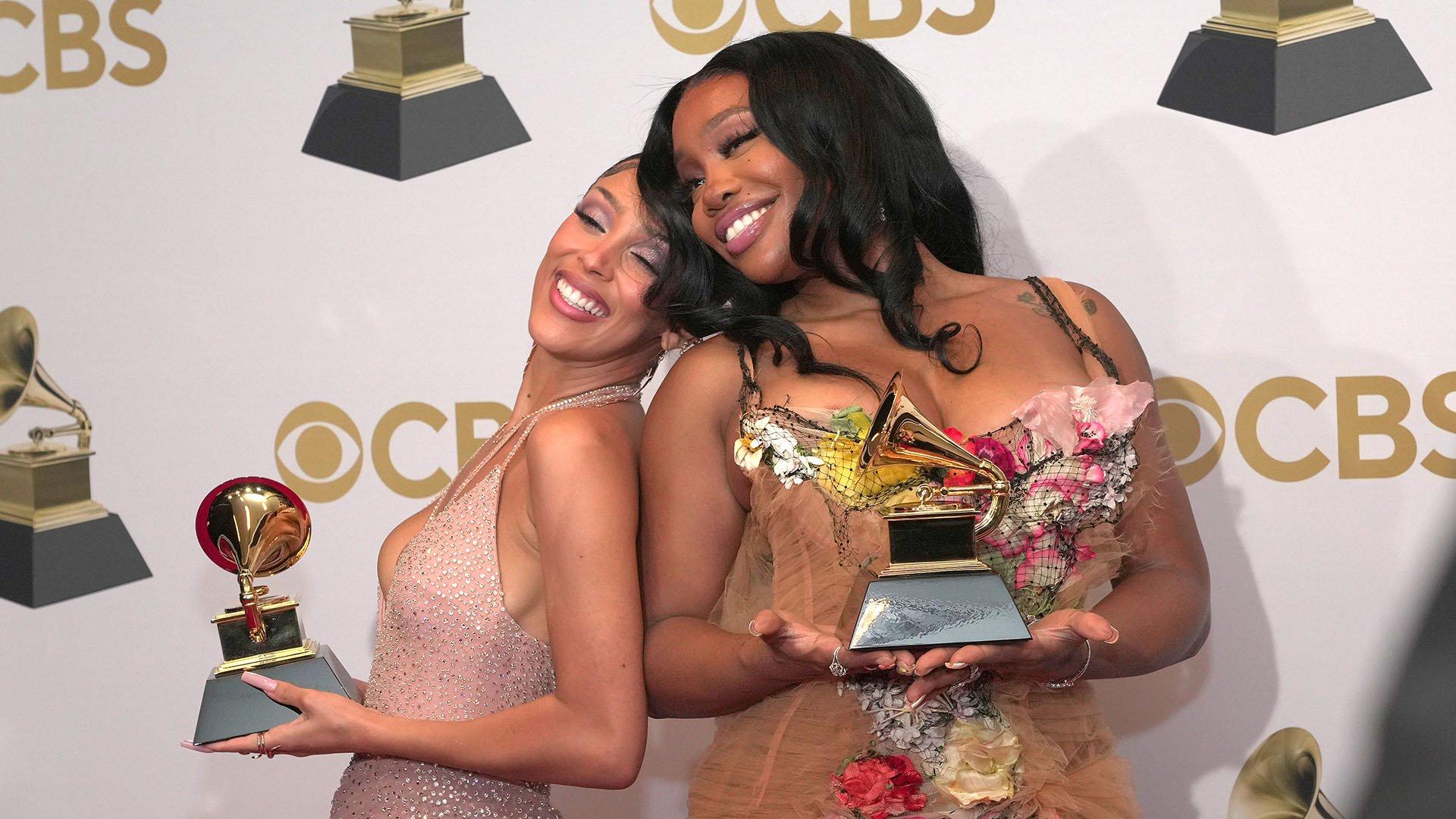
Photo: Kevin Mazur/Getty Images for The Recording Academy
video
GRAMMY Rewind: Watch Doja Cat & SZA Tearfully Accept Their First GRAMMYs For "Kiss Me More"
Relive the moment the pair's hit "Kiss Me More" took home Best Pop Duo/Group Performance, which marked the first GRAMMY win of their careers.
As Doja Cat put it herself, the 2022 GRAMMYs were a "big deal" for her and SZA.
Doja Cat walked in with eight nominations, while SZA entered the ceremony with five. Three of those respective nods were for their 2021 smash "Kiss Me More," which ultimately helped the superstars win their first GRAMMYs.
In this episode of GRAMMY Rewind, revisit the night SZA and Doja Cat accepted the golden gramophone for Best Pop Duo/Group Performance — a milestone moment that Doja Cat almost missed.
"Listen. I have never taken such a fast piss in my whole life," Doja Cat quipped after beelining to the stage. "Thank you to everybody — my family, my team. I wouldn't be here without you, and I wouldn't be here without my fans."
Before passing the mic to SZA, Doja also gave a message of appreciation to the "Kill Bill" singer: "You are everything to me. You are incredible. You are the epitome of talent. You're a lyricist. You're everything."
SZA began listing her praises for her mother, God, her supporters, and, of course, Doja Cat. "I love you! Thank you, Doja. I'm glad you made it back in time!" she teased.
"I like to downplay a lot of s— but this is a big deal," Doja tearfully concluded. "Thank you, everybody."
Press play on the video above to hear Doja Cat and SZA's complete acceptance speech for Best Pop Duo/Group Performance at the 2022 GRAMMY Awards, and check back to GRAMMY.com for more new episodes of GRAMMY Rewind.
How 'SOS' Transformed SZA Into A Superstar & Solidified Her As The Vulnerability Queen
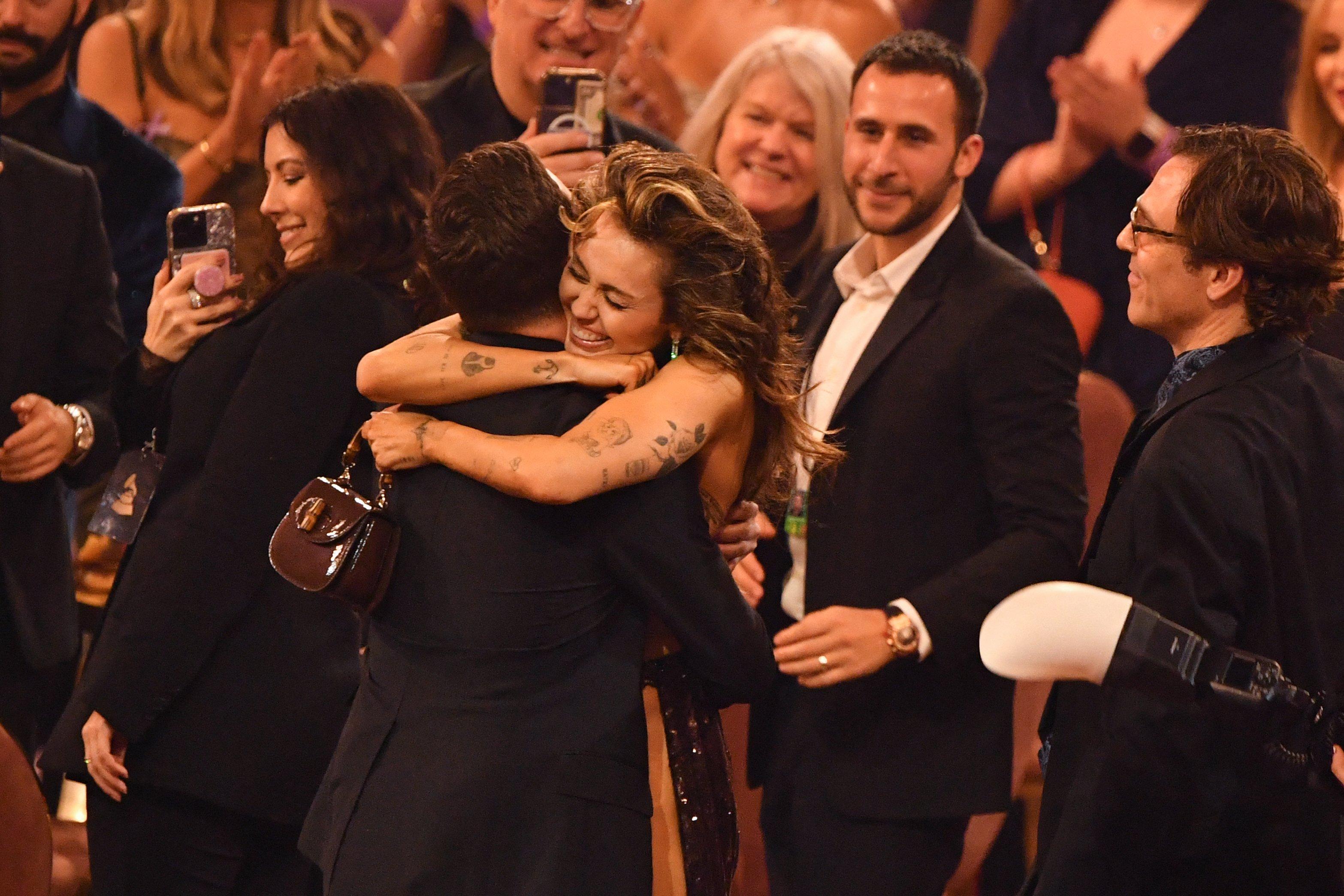
Photo: Valerie Macon / AFP) (Photo by VALERIE MACON/AFP via Getty Images
news
2024 GRAMMYs: Miley Cyrus Wins The GRAMMY For Record Of The Year for "Flowers"
2024 GRAMMYs: Miley Cyrus Wins The GRAMMY for Record Of The Year for "Flowers"
Miley Cyrus has won Record of the Year at the 2024 GRAMMYs for her hit “Flowers.”
Accepting the award with her production team, Cyrus was irreverent and self-effacing, especially after having already won her first ever Golden Gramophone for Best Pop Solo Performance earlier in the evening.
“This award is amazing, but I really hope it doesn’t change anything, because my life was beautiful yesterday,” Cyrus said.
The pop singer beat out Lana Del Rey, Taylor Swift, Jon Batiste, Dua Lipa, SZA, Olivia Rodrigo, and Billie Eilish for the award, which was presented by Mark Ronson and his mother-in-law, the actress Meryl Streep. “Flowers” was a massive commercial hit, debuting at Number One on the Billboard Hot 100 and spending eight consecutive weeks in the top spot.
As she finished her speech, during which she thanked her collaborators, their partners, and her fans, Cyrus said “I don’t think I’ve forgotten anyone, but I might’ve forgotten underwear.”
Keep checking this space for more updates from Music’s Biggest Night!
2024 GRAMMY Nominations: See The Full Winners & Nominees List
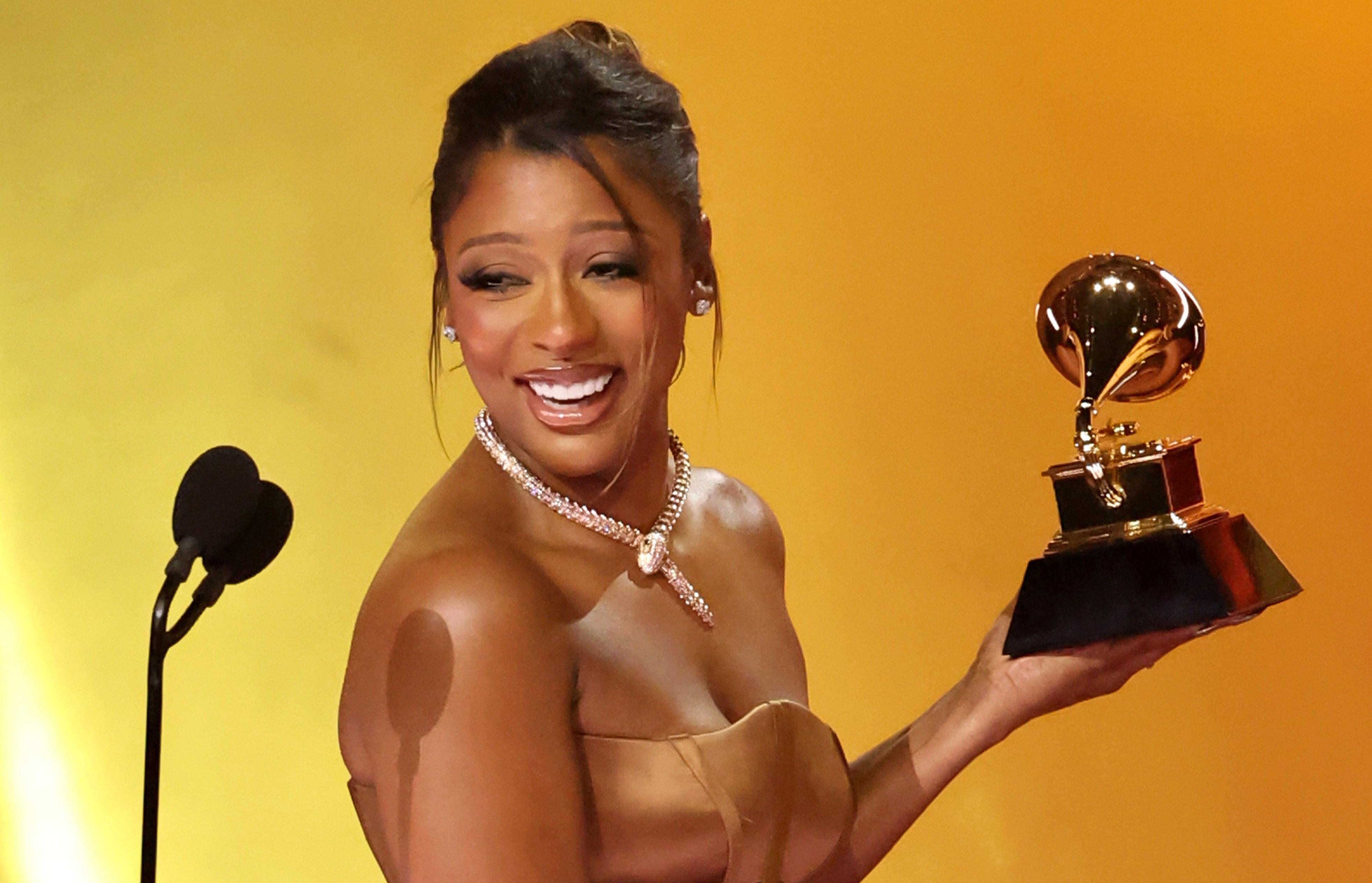
Photo: Amy Sussman/Getty Images
news
2024 GRAMMYs: Victoria Monét Wins The GRAMMY For Best New Artist
Victoria Monét beats Gracie Abrams, Fred again.., Ice Spice, Jelly Roll, Coco Jones, Noah Kahan, and The War And Treaty.
Victoria Monét has won Best New Artist at the 66th GRAMMY Awards.
Tearfully accepting the award, the rising R&B star gave an eloquent speech in which she compared herself to a plant growing out of the soil of the music industry.
“My roots have been growing underneath ground, unseen, for so long, and I feel like today I’m sprouting, finally above ground,” she said.
Monét beat out Gracie Abrams, Fred again.., Ice Spice, Jelly Roll, Coco Jones, Noah Kahan, and The War and Treaty for the award. It was given out by last year’s winner, Samara Joy.
She really puts in the work and she is being rewarded now more than ever for it," producer D'Mile, who has known Monét since the beginning of her career, recently told GRAMMY.com. "She grows more and more confident and sure about what she's aiming for as she continues her journey."
This was not Monét’s first win. Her album Jaguar II won Best Engineered Album and Best R&B Album earlier in the day during the GRAMMYs Premiere Ceremony.
Keep checking this space for more updates from Music’s Biggest Night!
